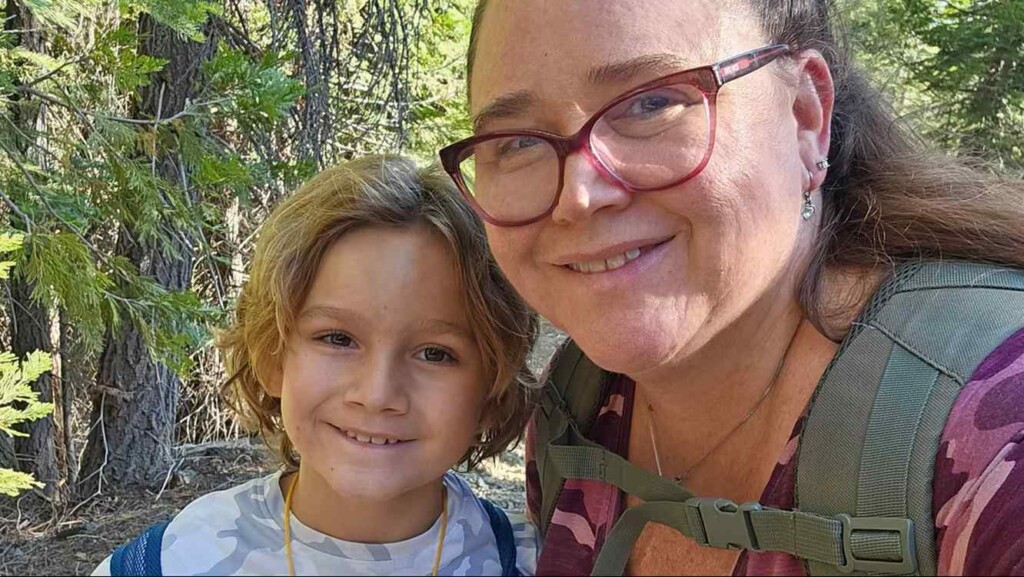

Despite a 2-day ordeal lost in deep woods, a mother and her son “did everything right,” stayed safe, and used a clever trick to help rescuers find them.
The story began when Tami Laird and her son Stirling left their home in Calaveras County, California on July 11th to a Boy Scout camp.
The camp director warned parents the road would be rough, so Ms. Laird had no objection about pulling off CA highway 4 onto a dirt road with the camp’s location plugged into the GPS app on her smartphone.
That was the first and roughly only mistake she made that day. As the thick woods and remote country blocked the GPS from tracking them accurately, and despite following its directions for 30 minutes, it was clear from the deteriorating condition of the track and the camp still being 8 miles away that they had run dangerously awry of their route.
Retracing their steps was no use, as the spider’s web of rights and lefts was impossible to make sense of in reverse. The sedan she was driving was beached several times on the uneven road, and the pair had to dig it out repeatedly until one time when they couldn’t.
They were stuck.
From the mistake that left them stranded on the road, Tami Laird, with a little help from her little scout, made the correct calls: first by remaining calm and taking time to consider their options as night fell; next by opting to stay in the car.
While history shows that this was the right decision, it was a long, sleepless, and anxious night for both of them. The next morning, having tried and failed to call 911 the day before, they needed to consider how to be found.
They hatched a plan to leave notes along the various roads they had crisscrossed in the hopes that someone with knowledge of the terrain would find them. Again, Laird made a good call. The forest was dense, and hills surrounded them. She feared that walking too far afield would leave them unable to find their way back, so she used scissors to cut strips of fabric off a bedsheet and tie them around trees to blaze their trails.
“Me and my son are stranded with no service and can’t call 911,” one of the notes said. “We are ahead, up the road to the right.” Another note left a phone number to call.
In the summer heat the constant hiking was exhausting, and the pair decided to call it for the day having determined where next to leave other notes should no one find them that night. As Stirling began to despair, Laird suggested they play cards to settle down, but no sooner had the deck been shuffled then they heard a wonderful, wonderful sound.

The honk-honk of a truck, coming to rescue them, which was when “the tears started,” as Laird told CNN.
MORE SURVIVAL STORIES: 20-yo Hiker Survives to See Family Again After Incredible 50 Days Lost in the Rockies
“We were definitely a good team out there,” Laird added, crediting Stirling for keeping her calm. “He kept trying to keep me positive because I kept saying things like, ‘I don’t think we’re going to get rescued,’ or ‘Our only hope is a helicopter, and I don’t think a helicopter is going to come.’”
Little did they know it at the time, but someone tried to call Laird after it was clear they were overdue in arriving at the camp. They communicated this to the search and rescue division of the Calaveras Co. Sheriff’s Office, which established a base at a nearby recreation area to conduct a search of the “complex network of interconnecting, labyrinth-like roads,” a statement from the Sheriff’s Office read.
“At approximately 5:40 PM, a Search and Rescue team located a handwritten note posted at an intersection of a remote Forest Service Road. The note indicated that the author and her son were stranded and in need of assistance. The team followed the road and found another note, which provided additional information, including a telephone number and the names of the missing individuals. About a mile later, the searchers located the missing persons and their vehicle.”
MORE SURVIVAL STORIES: Rescuers Relieved to Find Pilot, 2 Children Survived Crash Landing on Frozen Alaskan Lake
The statement went on to say that the teams had to communicate on HAM radio frequencies, such was the remoteness and density of the forest area; neither cell service nor conventional radio waves worked.

CNN meanwhile reported that the rescue team applauded Laird for her instincts, telling her she’d done everything right. Her fiancé also shared her last known location with the rescuers.
If traveling by car in remote areas, the first and often best thing you can do to protect yourself isn’t to stock your trunk with survival gear, food, or water, but rather to leave a detailed plan with someone you love, and give them a clear deadline for calling search and rescue.
MORE SURVIVAL STORIES: Man Gets Stuck in Lake Michigan Quicksand and Comes Out with New Girlfriend
If you get lost like Laird and Stirling, and believe there’s no reason anyone knows you’re missing, the best thing you can do is follow Laird’s instincts and stay with your car.
A German backpacker lost for 12 days in the Australian outback became so when she abandoned her broken-down vehicle after hitting her head in the crash, walking away in a daze. If the terrain can block radio signals, it’s dense enough to allow one to get lost even just a few dozen yards from their vehicle, so marking trails like Laird did is a must.
Only after securing protection from the elements and animals, and maximizing the chance of rescue by signaling or leaving evidence of their presence should one consider water, and eventually food.
SHARE This Great Survival Story And Important Lessons With Your Friends…






